It's 26th October 2024, St Jude’s Smith Campus. A sense of celebration fills the air, and despite the morning chill and cloudy weather the school is abuzz with excitement. In the school arena, students in their immaculate uniforms and blue and yellow graduate ribbons pose for photos with their families, teachers, and sponsors.
Today marks an important day for St Jude’s as 235 Form 4 students, the school’s largest class to date, graduate from their Ordinary Level studies.
Tanzania's education system has three key stages: seven years of primary school from Standard 1 to 7, then four years of secondary school from Forms 1 to 4 in Ordinary Level (O Level) studies, and finally, two years of Advanced Level (A Level) studies at Forms 5 and 6. Schools typically organise a graduation ceremony at the end of each stage, as do St Jude's.
"Attending a graduation ceremony at St Jude's is an experience like no other," says Mr Sangito, St Jude's Assistant Headmaster and a senior event organiser. "It's one of those events that brings together the entire St Jude's community of students, parents, staff, and supporters in celebration," he adds.
But while each graduation is significant and equally celebrated with enthusiasm by the St Jude's community, the Form 4 graduation feels particularly special. At this stage, graduates choose to continue with the final two years of A Levels and specialise in specific subjects or they may pursue an accelerated path to a career by completing a diploma or certificate at college.
"Starting A Level feels like opening a new chapter in my academic journey," says Lilian, St Jude's Form 4 graduate and a host of Inside St Jude's podcast. "I'll be moving to a new campus with new teachers and new uniforms. Plus, I'll be studying more science subjects which is more fitting for my career goals in computer science," she adds.
Meanwhile, Fatuma, another St Jude's graduate and Lilian's co-host at Inside St Jude's podcast, is going for a different route. She is one of the highly motivated graduates who are opting to apply to Beyond St Jude’s Alternative Pathways Program (APP). The APP was established in 2020 for students who decide to pursue a diploma or certificate in college, in lieu of the traditional St Jude’s A Level pathway.
"That's why this graduation means so much," reflects Fatuma. "It's an opportunity to begin exploring my career path in a new setting," she adds.
At St Jude's, 96% of students who begin secondary school education complete Form 4. The school's holistic approach to education ensures students excel beyond academics by developing useful extracurricular skills in sport, art, IT, and public speaking. As a result, they graduate with practical skills that they can apply immediately to positively impact their communities.
"One of our fellow students represented the country at the 2023 Commonwealth of Nations games in athletics while a team from St Jude's emerged the first runner-up at the Tanzania National Debate Championship (TNDC) and East African Schools Debate Championship (EASDC)," said Rahel a Form 4 graduate in the Farewell speech during the ceremony.
In the coming weeks, the graduates will sit for their Certificate of Secondary Education Examination (CSEE), a national exam organised by the National Examination Council of Tanzania. In Tanzania, only those who pass the CSEE qualify to proceed to A Levels. Passing these exams also improves college enrolment prospects for students pursuing a diploma course.
Whichever path they choose, a St Jude's scholarship is available to support successful graduates in their next academic step.
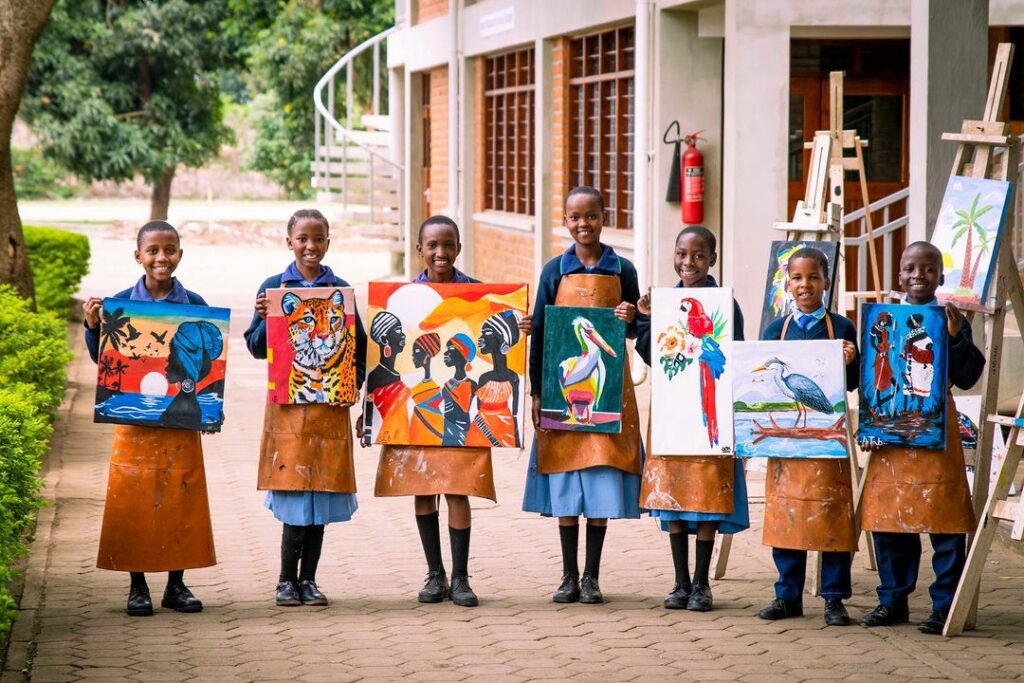
Sanaa
[Sah – Naah] Noun
Definition
In its simplest form, "sanaa" is a Kiswahili word which means "art" in English. Broadly, the term includes visual and performing arts such as painting, sculpture, music, dance, and other forms of skilled or creative work.
History
The word sanaa is of Arabic origin, which means "art" or "craftsmanship". Its history goes back to the interaction between Arab and East African traders between the 7th and 12th century. Over the years, the Kiswahili version of the word has evolved to include other forms of creative expression.
Sanaa at St Jude's
Sanaa is an important part of St Jude's holistic approach to education. The school encourages creative expression among the students and provides them the time, space, and materials to hone their artistic skills.
Student Art Program
In 2022, St Jude's launched the Student Art Program, a special initiative that celebrates and promotes the creative expression of students through art, and painting in particular. The program was further expanded to include an onsite gallery at Sisia Campus and an online gallery on the school's website.
The art gallery features stunning artworks, 100% created by students, that embrace the culture and diversity of Tanzania. It's a perfect spot for visitors and supporters to experience sanaa at St Jude's, and support our budding artists. Student artists receive a 10% commission fee of the price when their artwork is sold at the gallery. The rest of the money is used to support the Student Art Program with materials, workshops, mentorship, and scholarships for budding artists.
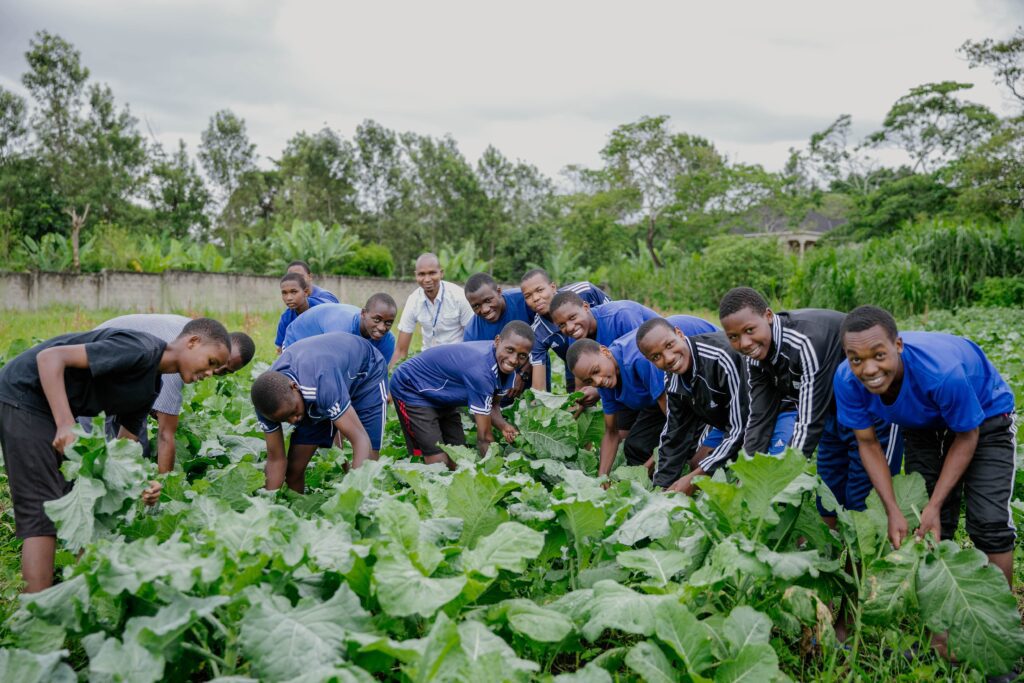
At St Jude's Secondary School, Smith Campus is a plot of land commonly called the school shamba (shamba means farm in Kiswahili). It's one of the most beautiful places on campus, thriving year-round with fresh fruits, vegetables, and livestock. The shamba also serves as a practical learning ground for our students' agriculture lessons and a source of nutritious, homegrown food for the school.
Although the farm is confined within the school walls, it has recently become a new outlet for St Jude's kindness, extending its benefits into the wider community.
"One of the common community outreach activities at school is volunteering to assist at local orphanages during weekends," explains Zuberi, a student at St Jude's Secondary School. "After doing this for a while, two of our schoolmates came up with a brilliant idea to go the extra mile," he adds.
The pair, inspired to make a more tangible impact, conceived an initiative to cultivate vegetables at the school shamba and donate the harvest to special groups of people within the community.
The proposal was well received by the school, and a small piece of land was allocated to the group. Soon, word started spreading around campus, attracting other students to join the initiative.

"I was one of the first volunteers to join the group," recounts Zuberi. "We immediately set to work, dedicating our spare time to bring the project to fruition," he adds.
The group comprises members from different year levels working in rotations, ensuring the farm is not neglected despite their busy schedules throughout the week. The group members consistently dedicate several hours to tending their vegetable garden on weekends and after-school hours. No wonder the farm yields bountiful harvests.
"Everyone is supportive, generously sacrificing their free time and effort for a cause," says Zuberi passionately. "It is truly the spirit of St Jude's in action," he adds. One of the active members of the group is Jastini, a St Jude's student particularly interested in agriculture and supporting children. Jastini comes from an agricultural background and loved farming from a young age. So, when he came across the initiative that supports the less fortunate through the school shamba, he quickly jumped at the opportunity.
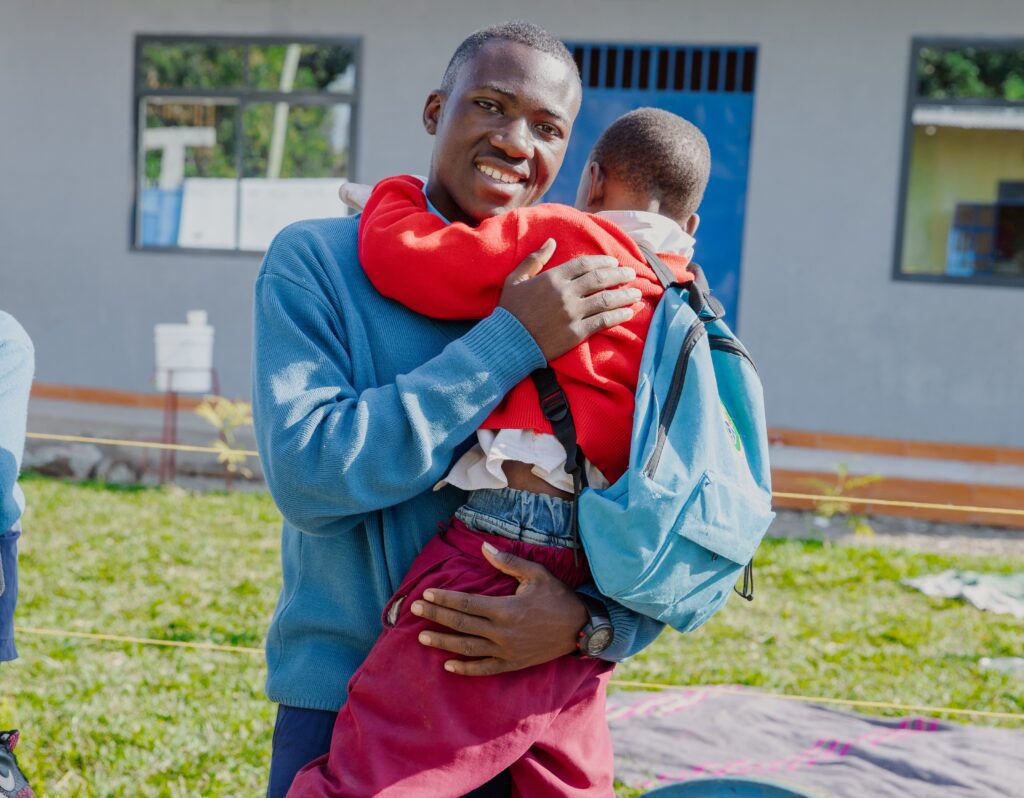
"It's one of those activities that I look forward to whenever I have a few minutes to spare," says Jastini with a smile. "The fact that I get to do something that I enjoy and still impact others is enough motivation for me," he adds.
Though the group is only several months old, they have already harvested over 200 kg of vegetables, most of them going to orphanage centres around Arusha, with the rest supplementing the nutritional needs of students on special diets at school. On their last outing, the group donated fresh vegetables to a nearby orphanage centre in addition to assisting with manual tasks and playing with children.
"Our aim is to help the centres offset their operating costs for food while providing children with essential nutrients for their growth," explains Jastini. "Knowing that we are making a difference in the lives of the children at these orphanages makes all our efforts worth it," he adds passionately.
The St Jude's Spirit Program is a movement that unites our community in performing acts of service anchored on the school values of Respect, Responsibility, Honesty, and Kindness. Through this program, we celebrate and share stories of people who go above and beyond to help nurture Tanzania's future moral and intellectual leaders.
As part of the wider St Jude's community, we invite you to unite with our students, their families, staff, and alumni in the spirit of giving.

Vivian is a student at St Jude's Secondary School and the current Vice Chairperson of the Student Government. She enjoys playing netball, decorating, practising poetry, and reading inspirational books in the school library. Recently, Vivian spent a month at home for the end-of-term school holidays. We caught up with her about her recent holiday and plans for the new year.
In Tanzania, the final two years of secondary school are known as Advanced Level (A Level); Forms 5 and 6. The A Level school year is divided into two parts: the first term runs from July to December and the second term runs from January to June. Students enjoy a month-long break each term's end, in June and December.
How was your holiday?
My holiday was great! I spent time with my parents at home, travelled to visit my grandmother, and attended different workshops and seminars. Time well spent!
What was your favourite holiday activity?
I really enjoyed attending the workshops and seminars. I was a speaker at a youth conference on entrepreneurship and self-awareness. It was a pleasure sharing my knowledge and insights with fellow youth. Another highlight was visiting an orphanage and supporting the children with various items.
Did you learn anything while at home?
I learned some graphics design stuff from a professional. It's a skill that I intend to develop going forward.
What are you most excited about this term?
This is my first term as a Form 6 student (Form 6 is the final year of secondary school in Tanzania). This means we are the oldest students on campus!
What are your big plans for this term?
It's my final year in school, so I want to finish strong and get good grades. I also want to continue building on my leadership and engagement skills and work on becoming a positive influence on my fellow youth.
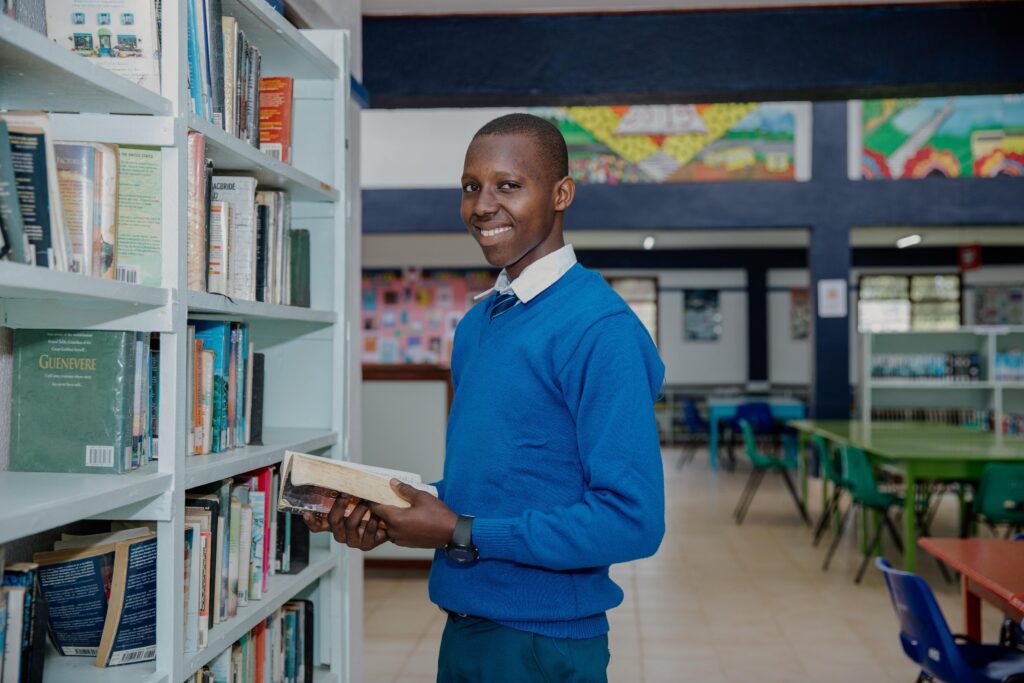
For four straight years, Jordan followed a tight schedule. He started his day at 4am, dedicating the next hour and a half to personal studies. By 6:20am, Jordan was ready to begin the 40-minute walk to school. He would return home around 6:30pm, spending an additional hour and a half after school in group discussions and revisions.
"The government school I attended didn't have enough boarding facilities for all students," explains Jordan. "Nevertheless, I had to do everything I could to pass my national examinations."
In Tanzania, there are two key stages to secondary schooling. The first four years of secondary school are called Ordinary Level (O Level) studies, from Form 1 to Form 4, and the final two years of secondary school are called Advanced Level (A Level), Forms 5 and 6. Students must sit for a series of standardised examinations organised by the government at the end of each stage. Only those that pass may continue onto the next level.
Jordan had to ace his Form 4 national examination to stand a chance of continuing with A Level studies. In 2023, close to 600,000 candidates sat for the exam. With only close to 1,000 A Level schools in the country, a student has to do exceedingly well in the exams to earn a spot in any of these schools.
"Two of my older siblings never made it to A Level," shares Jordan. "I have two younger siblings and my mother back at home. They were all rooting for me because I would be the first one in the family to do so," he adds passionately.
As Jordan approached his national examinations, his mother paid additional accommodation fees so that he could move into a boarding facility close to school. The support from his family and Jordan's hard work eventually paid off. He passed his national examinations with flying colours and was one of the top-performing students at his school!
"It was like a celebration when the results came out," reflects Jordan excitedly. "Everyone was so proud of me and it makes all the effort worth it."
Despite the impressive results, Jordan's path to A Level wasn't guaranteed. The shortage of secondary schools in Tanzania means that not every qualified graduate makes it to the next stage. The only way to get into a government secondary school is through an allocation by the government, which happens several months after the results are announced.
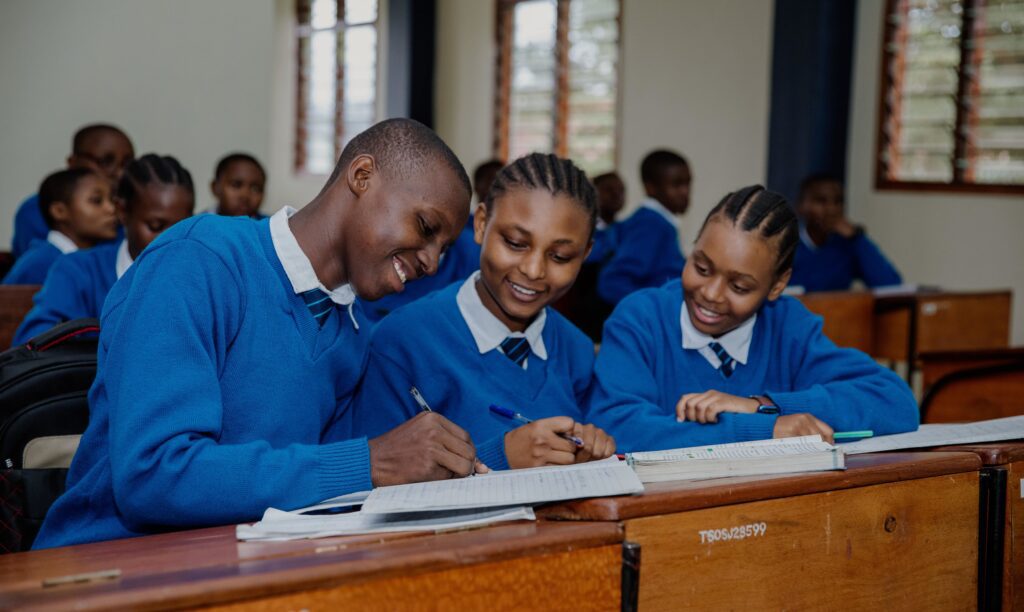
"Missing out on a government school would surely mean the end of the journey for me," says Jordan. "The only other option would be to join a private school, which we couldn't afford. I had done my part, now I had to wait and hope for the best," he adds.
Luckily for Jordan, he didn't need to wait long. His impressive academic results earned him an invitation to apply for an academic scholarship at St Jude's. Jordan jumped at the opportunity. He aced the academic tests and passed the rigorous poverty assessment checks to secure a spot at St Jude's. His strong academic prowess, underprivileged background, and strong character made him an ideal candidate for the scholarship.
"I have only been at St Jude's a few weeks, but it's already made a lasting impression on me. I'm now exploring my curiosity with computers and trying out different activities within the school," says Jordan, who hadn't used a computer before St Jude's.
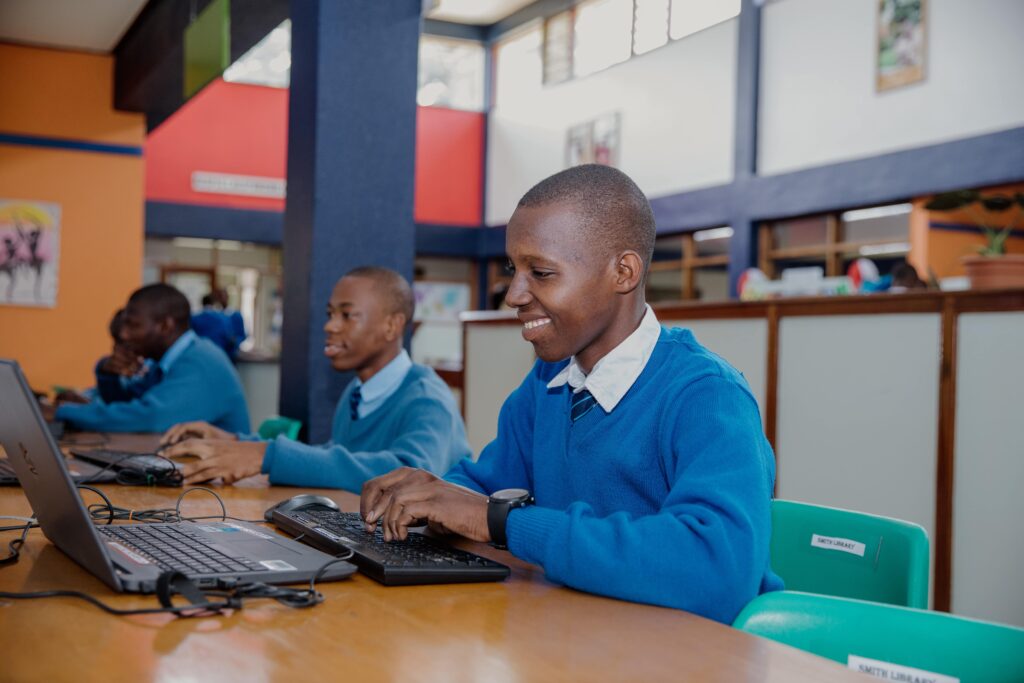
Jordan is pursuing physics, chemistry, and mathematics in his A Level studies and hopes to become an engineer someday. St Jude's holistic approach to education turns motivated students like Jordan into well-rounded individuals. Provided with a quality learning environment, strong academic program, and robust co- and extracurricular activities, students graduate from St Jude's better equipped to lift their families and communities out of poverty. With his hard work and determination, it's thrilling to imagine how much he'll accomplish in his next two years at St Jude's.
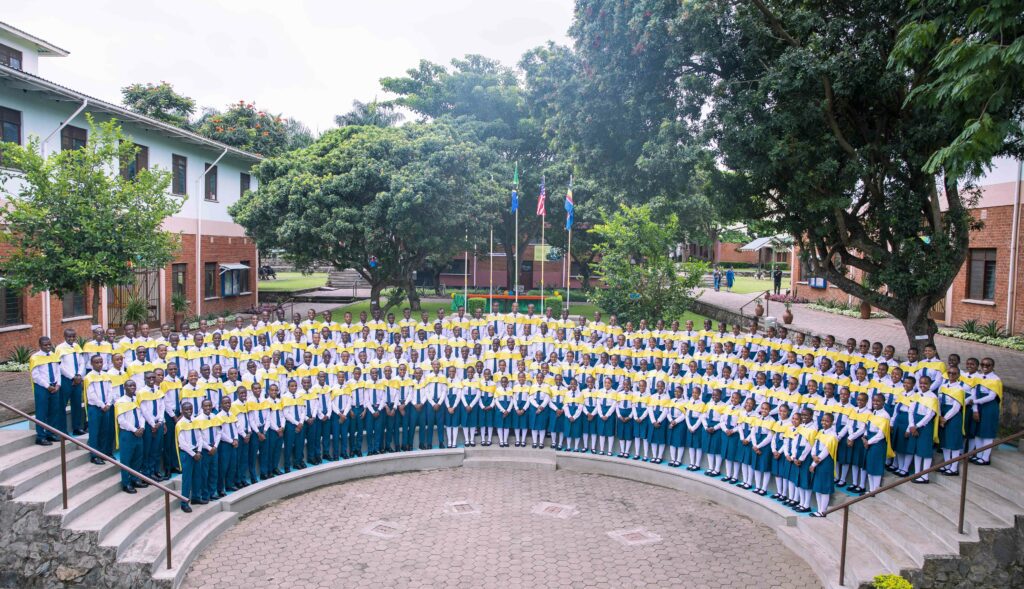
Attending a graduation ceremony at St Jude’s is an experience like no other. It’s a day of pride and celebration, representing years of hard work, dedication, and sacrifice. St Jude’s hosts three graduation ceremonies a year, corresponding to the three main levels of the Tanzanian school system, and a recognition ceremony for its alumni finishing their tertiary education.
The three key stages of school in Tanzania consist of seven years of primary school from Standard 1 to 7, then four years of secondary school from Form 1 to 4 in Ordinary Level (O Level) studies, and finally, the final two years of secondary school, Forms 5 and 6 in Advanced Level (A Level) studies. A graduation ceremony marks the end of each stage as students progress to the next phase of their academic journey.
While each graduation is a memorable occasion, the Form 6 graduation holds a special significance as it marks the transition to higher education in universities and colleges.
“It’s been a wonderful journey, and we leave St Jude’s with lovely memories,” says Andrea, Form 6 graduate, in his farewell speech on graduation day. “The achievements we’ve made demonstrate how exceptional our time here has been,” he adds.
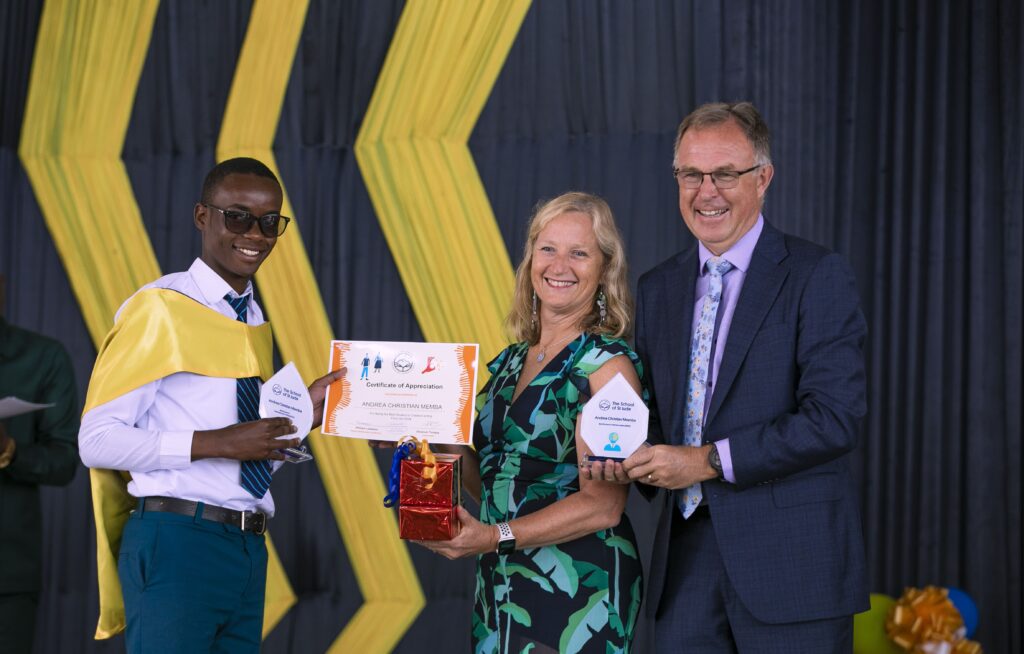
With 200 graduates, the 2024 Form 6 cohort was the second-largest group to graduate from St Jude’s. Their outstanding accomplishments include winning several national and international sports and essay writing competitions, excelling in regional and zonal exams, and pioneering impactful initiatives that are gaining recognition in the greater community.
“We stand here today as a testament to how we’ve fulfilled the school’s mission,” says Andrea. “We hope to achieve even greater things because of what has been invested in us throughout our time at St Jude’s,” he adds.
Completing secondary education is a remarkable achievement for students in Tanzania. However, several socio-economic barriers still hinder many students, particularly females, from completing secondary education. Existing gender disparities in enrolment and high dropout rates mean that only 27% of Tanzanian girls who start A Level, reach Form 6 graduation.
At St Jude's, however, all secondary school students receive 100% free, quality education, which includes safe boarding accommodation, nutritious meals, extracurricular programs, and more. The school’s holistic approach to education and promotion of gender equality ensures girls excel academically and in other areas. As a result, the school consistently maintains a 100% completion rate for all secondary school students.
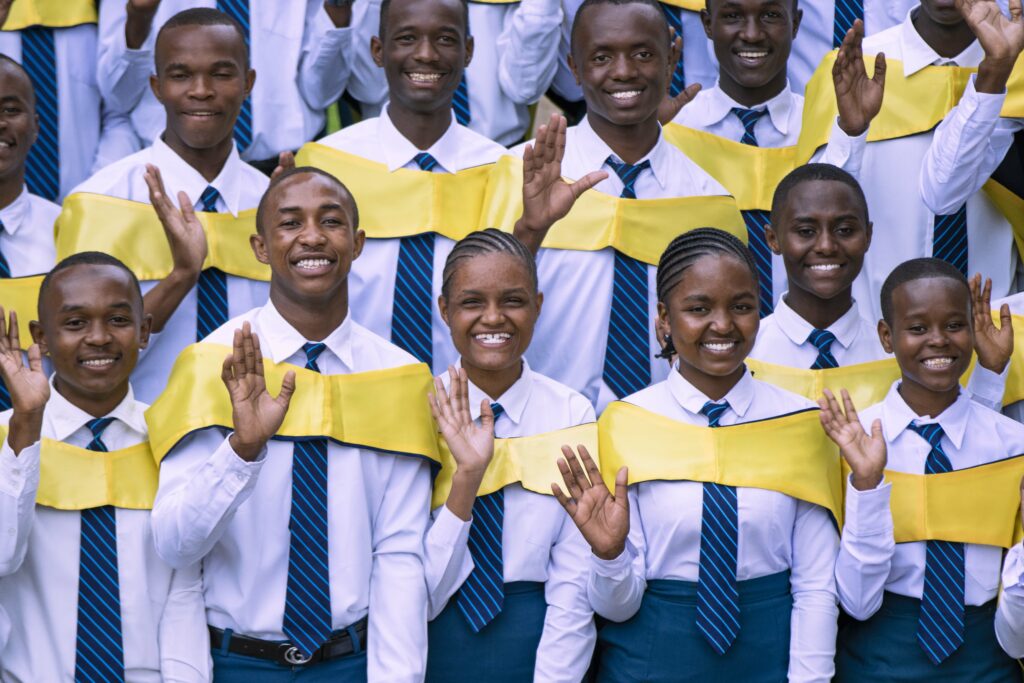
“One of our girls made it to the top 10 of the regional mock examinations, another invented a bean sorting machine that won first place on Science Day, and still another launched an initiative to support government school students with sanitary pads,” Noreen proudly shared at the graduation speech.
The 2024 graduation ceremony was particularly special as it was the 10th Form 6 graduation in St Jude’s history. Fittingly, it recorded the highest number of international visitors in attendance – over 90—in addition to more than 100 local guests, board members, alumni, and government officials. Among them was Mark Cubit, chairperson of the Australian board, Pat Sutliff, from our American Friends of The School of St Jude board, and David Stellar, who helped build the first three classrooms at St Jude’s more than 20 years ago.
“From little things, big things grow. And as you can see all around you, St Jude’s is changing lives as personified by the graduating class,” says David, as he reflects on the 20+ year journey of St Jude’s.
The next step for the graduates is pursuing higher education at various universities and colleges. Most opt to apply to the Beyond St Jude’s Scholarship Program (BSJSP), which supports graduates with tertiary education.
As part of the BSJSP, the selected graduates will undertake Community Service placements, volunteering as teachers in understaffed government schools, or at various placements throughout St Jude's. Then they go on to access higher education supported by St Jude's sponsors and donors.
Whichever path they choose, we know our graduates will personify the school’s vision of an educated community of moral and intellectual leaders, fighting poverty in Tanzania.